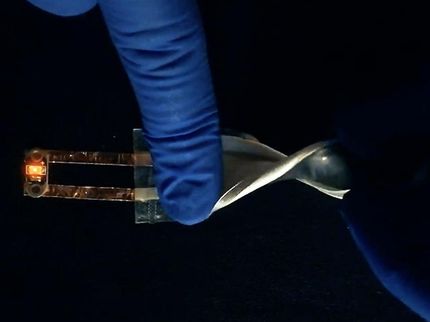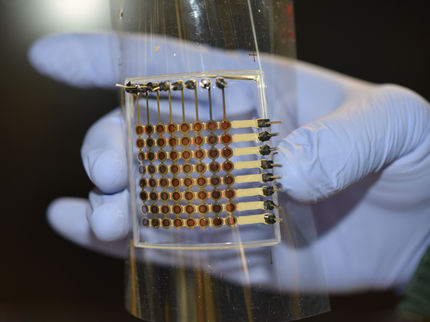WSU researchers create super-stretchable metallic conductors for flexible electronics
Washington State University researchers have discovered how to stretch metal films used in flexible electronics to twice their size without breaking.
The discovery could lead to dramatic improvements and addresses one of the biggest challenges in flexible electronics, an industry still in its infancy with applications such as bendable batteries, robotic skins, wearable monitoring devices and sensors, and connected fabrics.
The work was led by Rahul Panat and Indranath Dutta, researchers in Voiland College's School of Mechanical and Materials Engineering, and graduate student Yeasir Arafat.
Stretching a struggle
Researchers have struggled for years with designing and manufacturing the tiny metal connections that go into flexible electronics. The metal has to undergo severe stretching and bending while continuing to conduct electricity. Manufacturers have so far used tiny metal springs that can stretch and still maintain connectivity, but the springs take up space and make it difficult to design complicated, high-density circuitry. Furthermore, electricity has to travel farther in coiled springs, requiring more power and bigger batteries.
"The circuitry ends up requiring a ton of real estate and bulky batteries," said Panat.
Researchers have experimented with gold, which works better than other materials but is prohibitively expensive, and copper, which severely cracks when it is stretches more than 30 percent or so.
A quantum improvement
The WSU researchers found that when they made a metal film out of indium, a fairly inexpensive metal compared to gold, and periodically bonded it to a plastic layer commonly used in electronics, they were able to stretch the metal film to twice its original length. When the pieces broke, it was actually the plastic layer that failed, not the metal.
"This is a quantum improvement in stretchable electronics and wearable devices," said Panat.
While Panat is excited about the work and hopes it will be commercialized, the researchers also want to better understand the metal's behavior.
"A metal film doubling its size and not failing is very unusual,'' he said. "We have proposed a model for the stretchy metal but much work is needed to validate it. It's a good situation to be in.''
Original publication
Other news from the department science

Get the chemical industry in your inbox
By submitting this form you agree that LUMITOS AG will send you the newsletter(s) selected above by email. Your data will not be passed on to third parties. Your data will be stored and processed in accordance with our data protection regulations. LUMITOS may contact you by email for the purpose of advertising or market and opinion surveys. You can revoke your consent at any time without giving reasons to LUMITOS AG, Ernst-Augustin-Str. 2, 12489 Berlin, Germany or by e-mail at revoke@lumitos.com with effect for the future. In addition, each email contains a link to unsubscribe from the corresponding newsletter.





























































